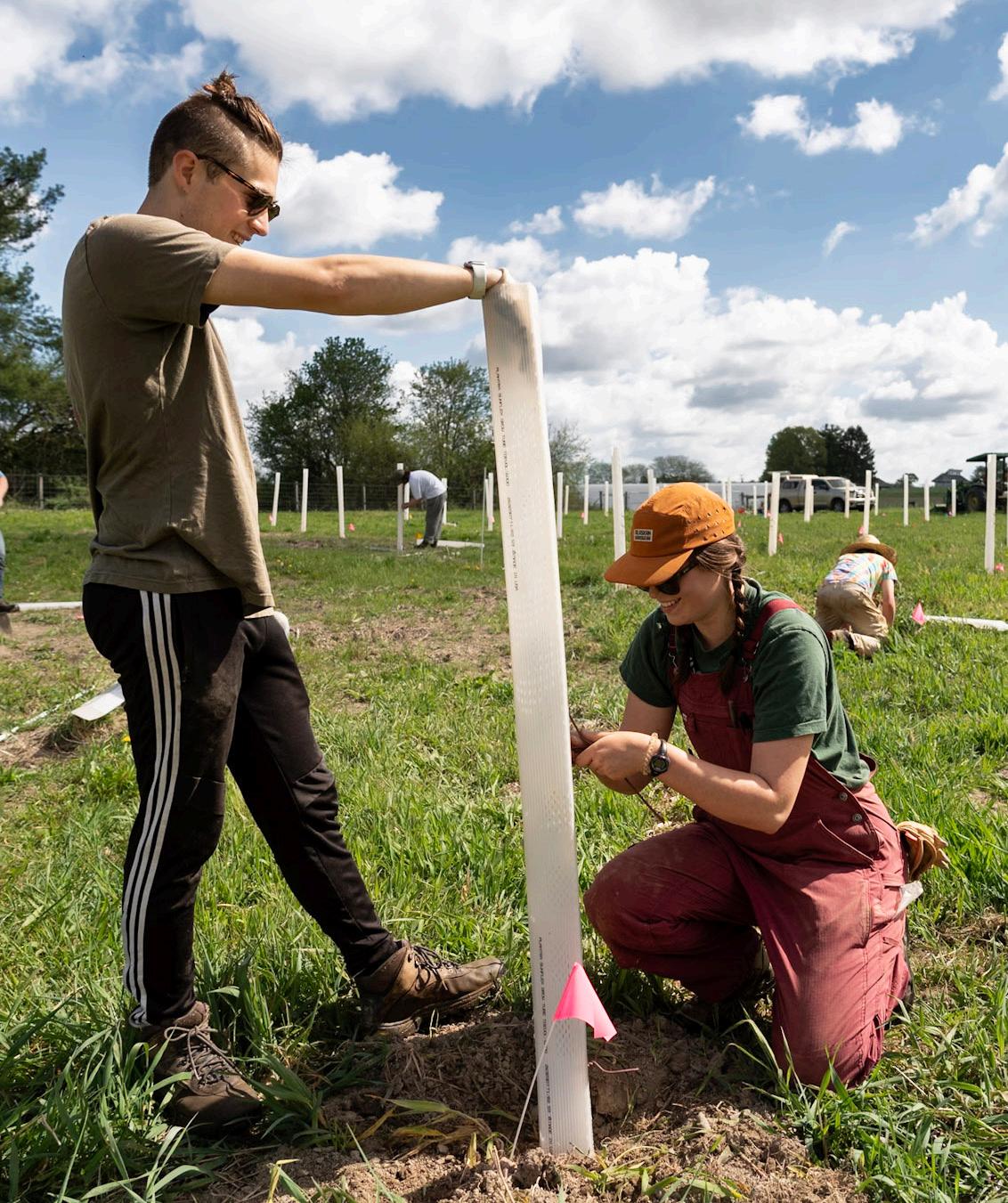




For those seeking answers to deeply complex questions about how to repair our agricultural system, Rodale Institute continues to be their first call.
In 2023, the Institute addressed innovators at Harvard Business School’s Climate Symposium on pathways for decarbonizing the farming sector through more sustainable agricultural practices, advised healthcare sector leaders on how to improve public health outcomes through our first Farm-to-Healthcare Immersion, and became a driving force in the United States Department of Agriculture’s Transition to Organic Partnership Program.
This year, the Institute also partnered with General Mills to accelerate producers’ adoption of regenerative agriculture techniques by guiding organic farmers in the Fortune 500 company’s supply chain with practical, onthe-ground technical assistance from Rodale Institute’s organic consulting division. It’s a remarkable move towards improving soil health by one of the world’s largest food companies. But our commitment to solving problems doesn’t end with industry.
The Institute further expanded its investments in higher education by partnering with Kansas Wesleyan University to grow programming focused on regenerative organic farming models. In the coming years, the Institute will develop an accredited Kansas-based Rodale Institute Farmer Training (RIFT) program and establish a Rodale Institute Regional Resource Center in Salina, Kansas, alongside the university to build a pipeline of skilled regenerative organic farmers.
These are just some of the key moments from 2023 where we’ve answered the call of our partners. As you review this year’s annual report, I hope you come away with a sense of hope for the future knowing Rodale Institute is diligently working with industry, government, and academia to fix what’s broken in our food system.

JEFF TKACH Chief Executive Of ficer, Rodale Institute
LEARN MORE AT Rodaleinstitute.org/annualreport2023




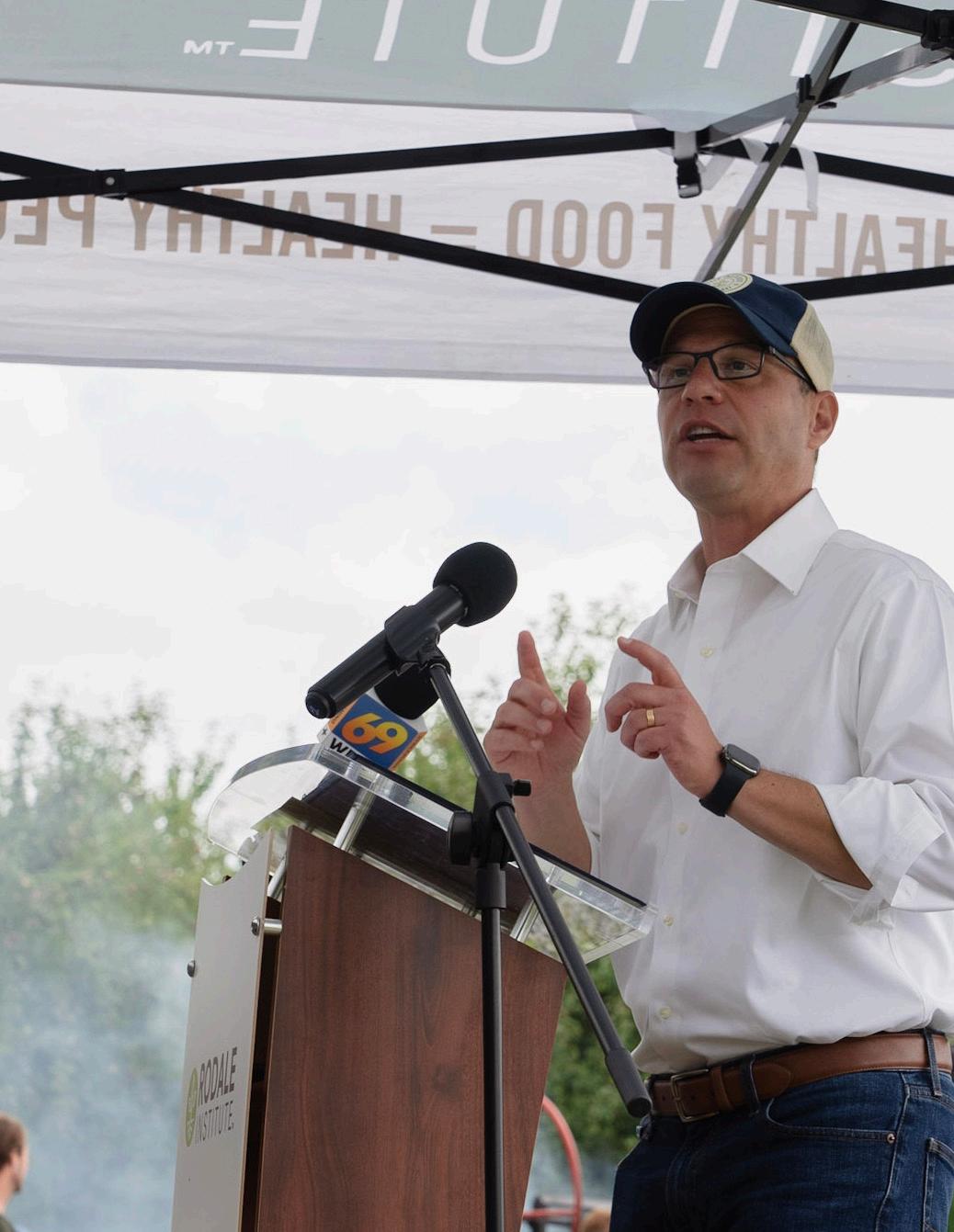
The Future Is Organic, According to Governor Shapiro
In July 2023, Pennsylvania Governor Josh Shapiro (right) addressed a crowd of more than 400 people at Rodale Institute’s main campus Organic Field Day, stating that investment in organic agriculture is “key” to growing the economy in the commonwealth. The governor, a Democrat, was joined by State Representative Jamie Barton, a Republican, and Pennsylvania Secretary of Agriculture Russell Redding, a fellow Democrat, in a show of bipartisan support for organic agriculture.
In his speech, Governor Shapiro credited Rodale Institute with positioning Pennsylvania as a leader in the organic industry and applauded the Institute’s investment in workforce development through the Veteran Farmer Training Program.
Rodale Institute and General Mills, Growing the Regenerative Organic Supply Chain
As part of its commitment to regenerative agriculture, General Mills initiated a new multiyear partnership with Rodale Institute in 2023 to improve soil health and support farmers within their network on the West Coast and in the Central Great Plains. Through this partnership, Rodale Institute’s organic consultants will provide technical assistance to organic farmers within the General Mills supply chain, including tomato producers in California and small grain producers in Montana. In addition, our consultants will monitor the soil throughout the project to assess how soil health improves as more regenerative practices are implemented.


Preliminary Results from the Vegetable Systems Trial
In 2016, Rodale Institute introduced the Vegetable Systems Trial (VST), a long-term research project and side-by-side comparison of organic and conventional vegetable production systems, at its headquarters in Kutztown, Pennsylvania. The primary goal of the VST is to connect soil health and human health. In 2023, the first preliminary results of the study were released.
Key findings:
• Over time, intensive tillage depleted soil carbon and increased soil bulk density.
• There was a 30 percent increase in labile organic soil carbon in the organic cropping system.
• Carbon levels increased in the top 4 inches of soil in the reduced-tillage system.
An Academic Alliance: Rodale Institute and Kansas Wesleyan University are Training the Next Generation of Organic Farmers
Rodale Institute began a new collaboration with Kansas Wesleyan University and Quail Creek Farms to create a workforce development program in Salina, Kansas. Together, this unique trio of organizations will establish an accredited Rodale Institute Farmer Training (RIFT) program and a Regional Resource Center in central Kansas to grow organic acreage in the Midwest and the Great Plains.
“Through this joint effort, Rodale Institute, Kansas Wesleyan University, and Quail Creek Family Farms will build a pipeline of farmers skilled in regenerative organic agricultural practices and establish a hub for agriculture education and innovation in Kansas.”
Jeff Moyer, Rodale Institute
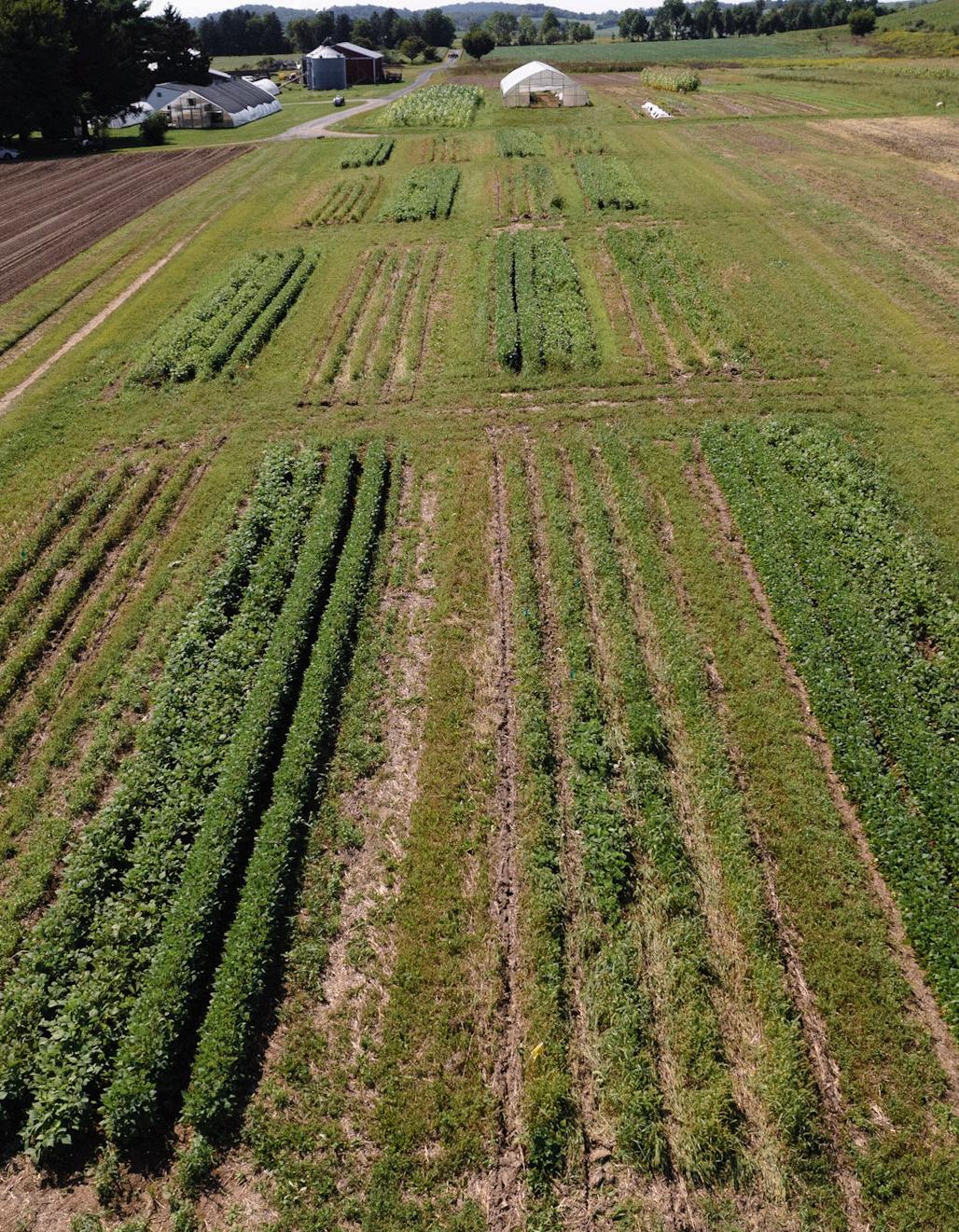
Meet Lizzy Beller, a young flower farmer and Rodale Institute Farmer Training (RIFT) alumna. After graduating from the RIFT program in the fall of 2022, Lizzy struck out to start her own flower farm in 2023 on a half-acre of land in Emmaus, Pennsylvania. In her first year of farming, Lizzy learned how to manage pests without pesticides and established new markets for her business. Learn about the joys and challenges of farming, and the unique ups and downs of her business, in a Q&A with the farmer herself.
Q: How did you become interested in farming? What brought you to the RIFT Program?
I was in my junior year of college when I broke my foot, and I learned about nutrition because I wanted to heal faster. I had never been able to heal quickly or build muscle quickly before. That led me down a rabbit trail about personal health and I learned how beneficial it is to grow your own food. Then I started growing, and I loved it so much. I started growing all my own vegetables and feeding myself, and I felt so much better and healed so well.
Then I grew vegetables commercially, and that was weary and not super fun. I joined the Rodale Institute Farmer Training program to learn more about organic farming, and I continued to work at a small commercial vegetable farm at the same time. Rodale Institute taught me how to handle large amounts of produce, and working at the small market garden veggie farm taught me fast succession and turnover and gave me experience in market gardening.

Q: What were your biggest takeaways from the RIFT program?
The farm visits and talking to farmers stood out to me. The RIFT program helped me to understand the real challenges to getting into farming, like getting land and creating infrastructure for your farm. Farmers that we met with admitted that they had worked a full-time job until they could get each piece of their farm in place and could slowly transition to full-time farming. That was a big eye opener for me.
Q: What is your advice to other small and beginning farmers?
You have to know going into it that your first year is going to be a mess. It is. You can’t project what pests you’re going to have, which are probably going to end up being your biggest issue. But it’s great to have that experience in your first year, so that you can learn from it. You already know you’re not going to be profitable in your first year because you put so much money in for supplies and everything else. So just know that your first year, as long as you finish the year, you did it. Set lofty goals, but it’s okay if you don’t make them.

Q: How did you become interested in flower farming?
I started to work with flowers at Rodale Institute events because I was interested and I asked about it. I started to help with some of the weddings that came up. The more I learned, the more I loved it. I saw that regardless of age or gender, people just light up when you give them flowers, and that resonated with me very well. I am a bit of a people pleaser, and flowers literally make people happy.
Q: Can you tell me a little bit about your flower farm?
Essentially, I have 48 rows, each 100 foot long, and I grow different flowers in each row. Some of the plants that I grow are sunflowers (I particularly like White Light), straw flowers, rudbeckia, celosia, zinnias, and cosmos. I grow other things purely for the fact that they’re scent heavy, and I love scents. I grow ‘Mrs. Burns’ Lemon’ basil, cinnamon basil, and sweet annie as fillers. I also grow perennials like pampas grass and Plectranthus for a consistent form of greenery. I’m still narrowing down my selections, but my absolute favorite is Lisianthus, a.k.a. “Lizzies”. In the language of flowers, they stand for gratitude. They last two weeks in a vase, aren’t ethylene sensitive so you can store them in a cooler, and are just really lovely flowers. I love them. And of course they’re called “Lizzies”... so there’s that, too.
I market my flowers in a variety of ways. I’ve hosted a few “cut-your-own” days. I do a flower subscription, which includes four weeks of bouquets and a “cutyour-own” day. I sell at a local farmers’ market. I tried one wedding this year, and it went really well. I’ve sold buckets of flowers for events before, and occasionally I sell wholesale to florists. This is only my second year flower farming, so I’m trying it all so that I can weed out what I don’t like.
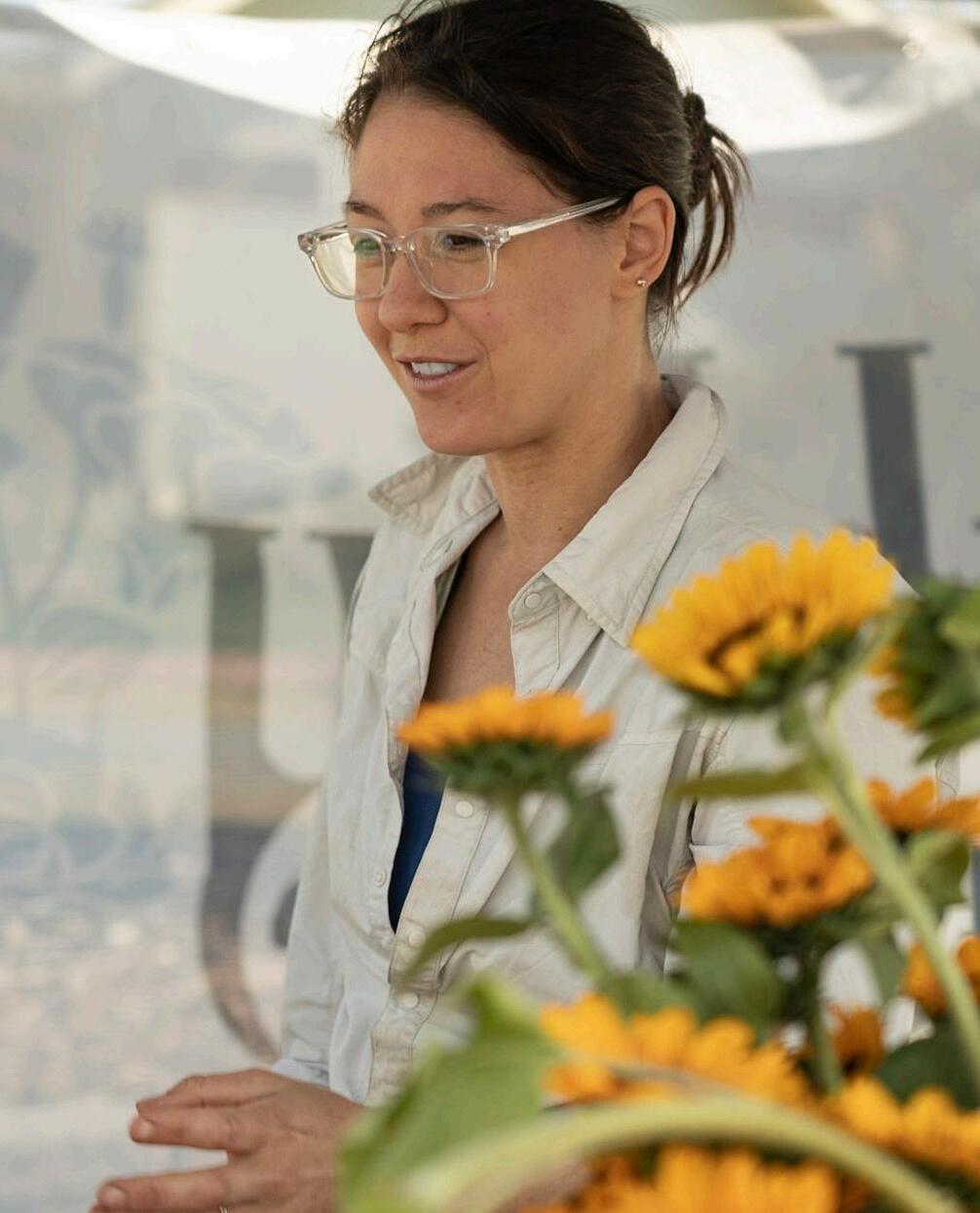
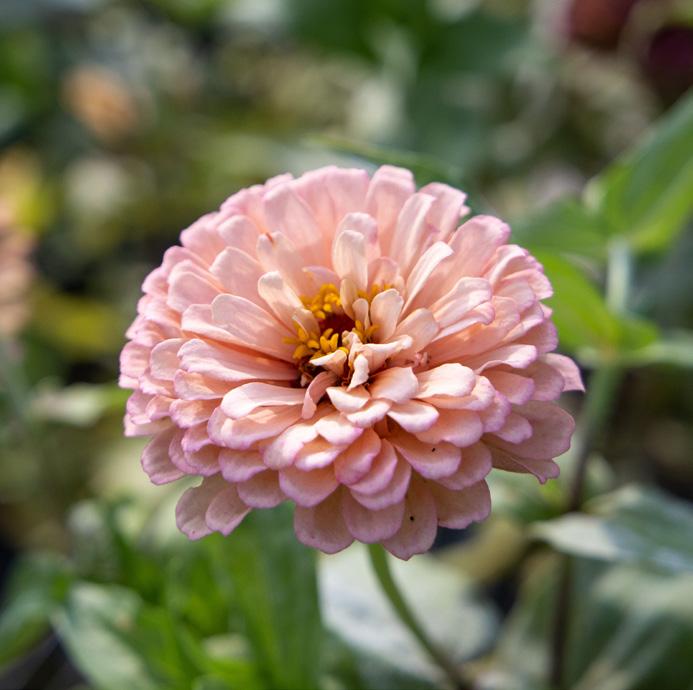
Q: What are your favorite parts of farming? What are the biggest challenges?
Cutting a whole armful of flowers is probably my highlight. I love harvesting. Pests are a huge challenge to deal with without spraying. But I’ve learned more about biosolutions, basically bugs that eat bugs, and I like that a lot.
My main pest is thrips because I have a lot of corn fields and hay fields around me. I’m not here to exterminate them, because if I exterminate them, I also kill all the bugs that eat them. So instead of spraying, I introduce natural predators like lacewings, mites, and pirate bugs to eat them. I also cut out crops that attract thrips, so there are a couple of flowers, like snapdragons, that I had to give up.


• 16 PhD scientists across 10 campuses
• 30+ active research projects at the Institute’s farms and education centers
• 15 peer-reviewed manuscripts published in 2023
• 15 Rodale Institute Farmer Training students graduated in 2023
• 1,200+ farmers, students, educators, and professionals hosted for tours, workshops, seminars, farm walks, and field days
• 2,400+ participants in Rodale Institute’s educational webinars
• 3,860 students enrolled in our virtual campus
• 97 farmer clients actively transitioning land to organic in 2023
• Consulting clients in 28 states
• 15 consulting staff members
• 50,000+ subscribers to e-newsletters
• 530,000+ unique visitors to website
• 175,000+ followers across social media
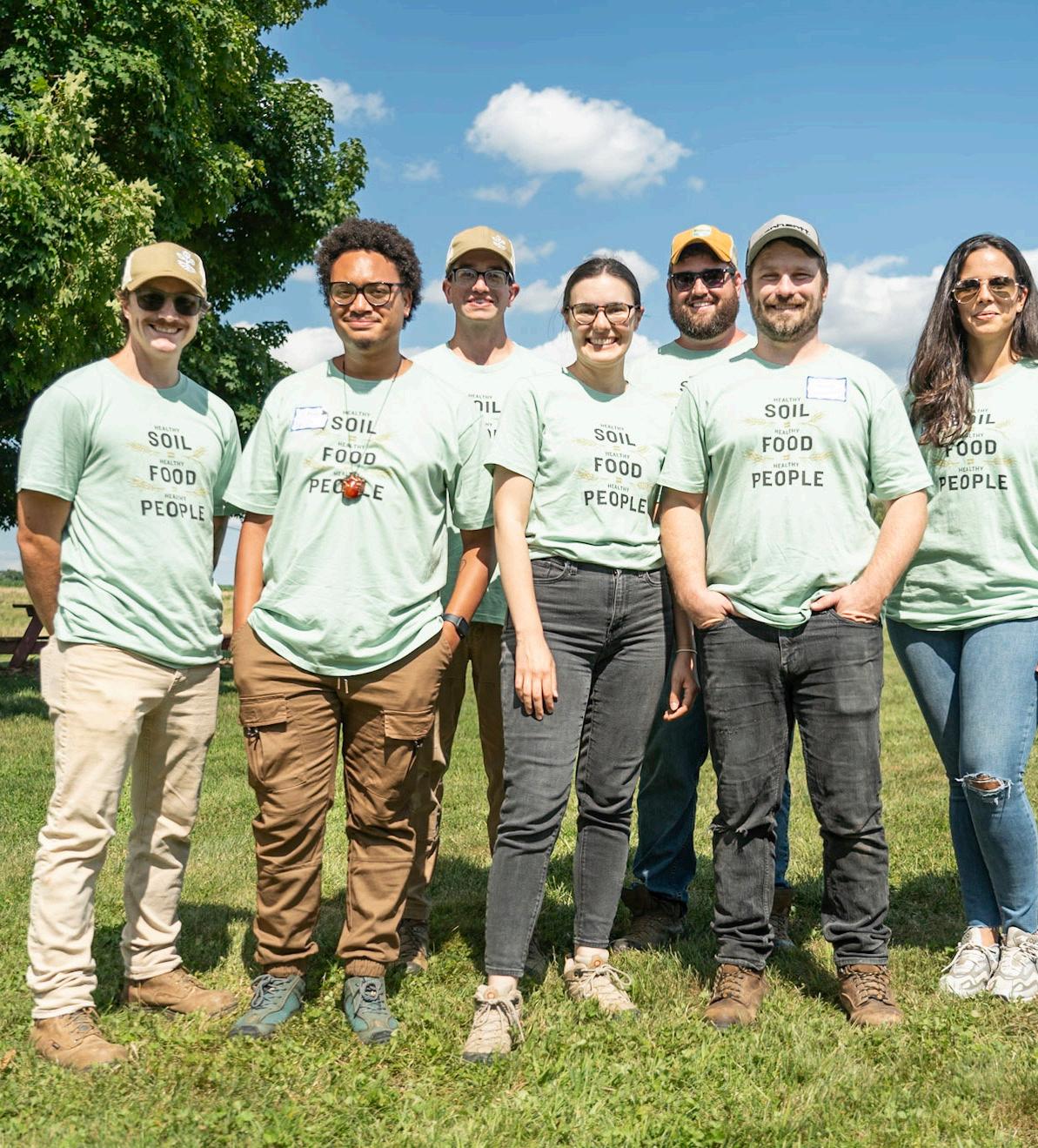


In April 2023, Rodale Institute welcomed Jeff Tkach as its new chief executive officer following the retirement of longtime executive Jeff Moyer. Prior to stepping into the role of CEO, Tkach served as the chief impact officer for the Institute for six years and as an executive for Organic Life and Prevention magazines at Rodale Inc. Tkach holds a bachelor’s degree from Kutztown University and a postgraduate Authentic Leadership Certificate from Naropa University in Colorado.
“I’m honored to lead Rodale Institute at this pivotal moment in history—when issues surrounding the climate, human health, and the long-term viability of agricultural land require practical solutions from innovative organizations like the Institute.” —Jeff Tkach
In 2023, Rodale Institute was chosen as a core partner to the Organic Trade Association to help achieve the objectives set by the new USDA Transition to Organic Partnership Program (TOPP) — part of the USDA’s $300 million Organic Transition Initiative (OTI) established in 2022.
The Institute’s role in National and Regional TOPP will be to give technical assistance to farmers transitioning to organic, connect buyers and sellers in the organic industry, and grow markets for organic products through both virtual and in-person events and one-on-one consultations.

In 2023, after two years of being closed to the public, Cascadian Farm reopened its strawberry, blueberry, and raspberry fields to the public for u-pick. The Cascadian Farm Home Farm, which previously belonged to General Mills, is now under Rodale Institute’s leadership. The property is a historic certified organic berry farm located in Washington and was gifted to the Institute in 2022 to be converted into a Regional Resource Center. The campus, now referred to as the Rodale Institute Pacific Northwest Organic Center at Cascadian Farm Home Farm (or the PNWOC for short), will serve as a research and education hub for farmers in the Northwest US.


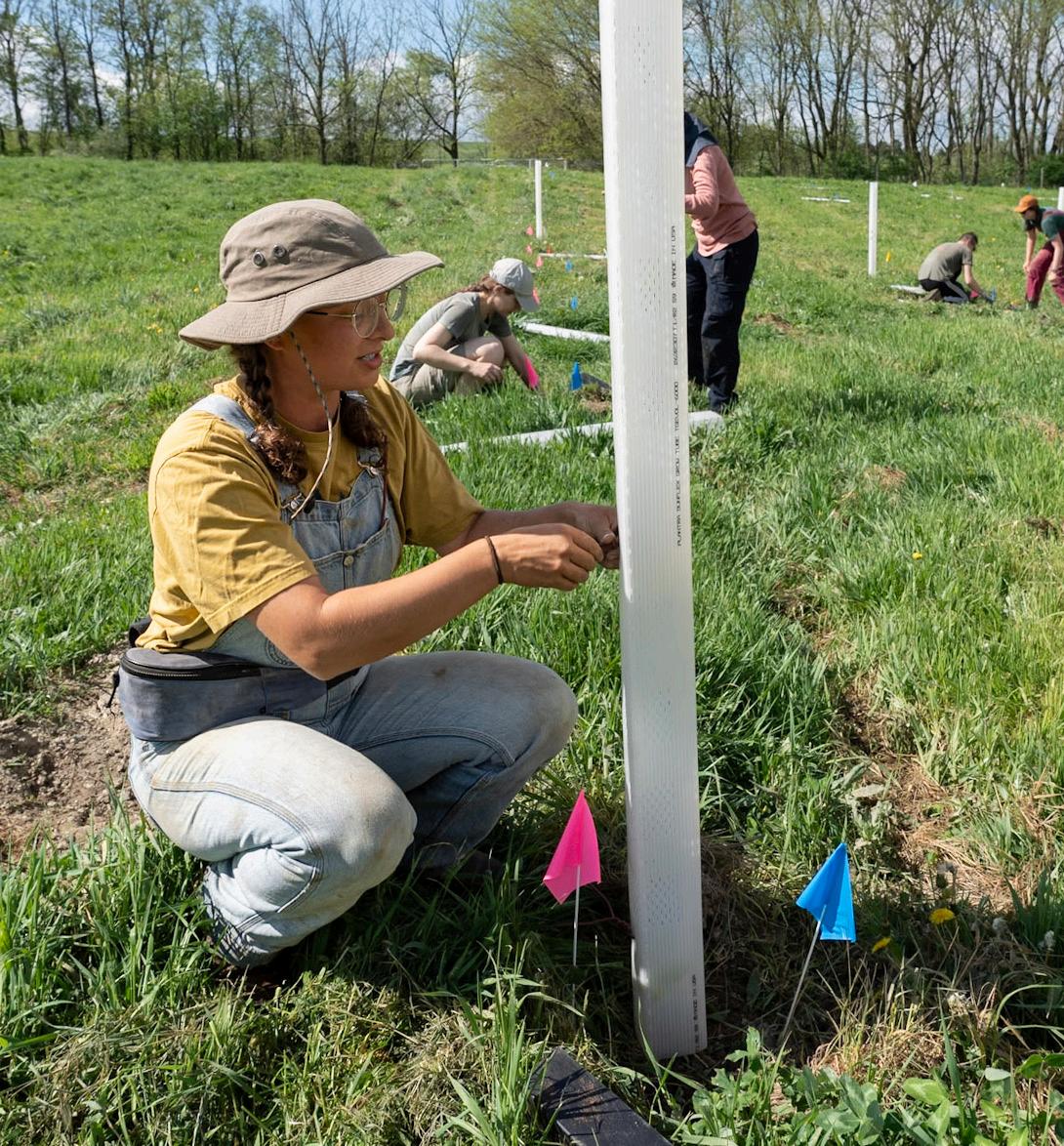
Project Funded by Northeast Extension Risk Management Education Center
In the fall of 2023, Rodale Institute entered a new partnership with Propagate to establish agroforestry research and demonstration orchards at several locations within the Institute’s network. The goal of the partnership is to promote the adoption of agroforestry and tree crop systems across the United States. In the fall, the Institute planted the first round of perennial crops at its main campus in Kutztown, Pennsylvania, with funding from the Northeast Extension Risk Management Education Center. The demonstration orchard will be used for educational and research purposes and can be accessed from the Visitor Center at Rodale Institute’s Main Campus in Kutztown, Pennsylvania.
Rodale Institute achievements in 2023:
• Hired its first full-time climate scientist, Michael Graham, phD.
• Celebrated an important milestone when its partner farm Trailside Organic Farm at Cornwall Manor received organic certification in its third year of operation.
• Hosted the inaugural Specialty Crop Symposium at the Rodale Institute Pocono Organics Center with presentations on saffron, CBD hemp, microgreens, ginseng, and other specialty crops.
• Organized a Farm-to-Healthcare Immersion, a multiday intensive conference focused on creating farm-to-institution models in hospitals, retirement homes, schools, and other large institutions.
• Sent CEO Jeff Tkach to speak to a class at Harvard Business School about the food and farming industry and regenerative organic agriculture.
Rodale Institute depends on supporters like you to continue the impactful work you see here. Please consider including Rodale Institute in your giving plan this year.


$12,416,442 Contributions & Corporate Grants
$584,074 Other/Investments
$4,522,486 Federal, State, & Local Grants
Total = $17,523,002
$11,672,351 Program Services
$1,346,753 Development $1,689,456 Management & General Total = $14,708,560



Our community of organic leaders is growing, and we hope you will consider joining this group of changeagents in healing the world. To become a member, email us at LeadershipSociety@RodaleInstitute.org or call 610-683-1400.
RECOGNITION NAMES
$10,000 + Anonymous
Roberta P. Beech
Paul Carmichael and Katherine Barton
Lynn Eden
Christopher and Deirdre Ely
Merry Hart
Jerry and Carolyn Holleran
Tracey McGrath
John and Arlene McLaren
Brian Melito
Christine A. Schantz
Christine J. Smith
Rebecca and Ross Williams
Dr. Charlotte Woodfin
CULTIVATOR DONORS
$5,000–$9,999
Anonymous
Bob Ackerley
Edwin R. Baldrige III and Lydia Panas
Amy Daws
Dr. Alison Grantham
Joshua Grizzle
Mar Haeussler
Mr. Robert J. LaBaugh
Sheppard Lake
Dr. Deborah Milkowski
Rupert N. Rossetti
Mikol Sesker
Patrick Sheridan
Bryan and Alison Shores
John Siegfried
Mike and Chay Wike
Bill Wolf
POLLINATOR DONORS
$2,500–$4,999
Scott and Irene Clopton
Michael Conner and Marcie Boettger
Christopher and Mary Emmi Copeland
June Heintz
Kris and Sarah Hughes
The Lund Family
Emily and Donovan Mattole
Karen and Ron Stark
Dr. Peter Swift and Diana McCargo
Samuel Taylor
HEIRLOOM DONORS
$1,000–$2,499
Anonymous
Ann and Mike Adornetto
Tracey Amdur
Sarah Andrews
Carolyn Auman
Tod and Christine Auman
Mary Louise Bailey
Todd Bartos
George and Anne Bird
Elias and Christina Bitar
Robin Bot-Miller and Heather Hund
Marian and Glen Bressner
Valerie Briston and Marko Kleine Berkenbusch
Courtney Brod
Ralph Brogdon Jr.
Wesley and Kate Brooks
Annie and Doug Brown
Herb Brown
Lee A. Butz
Dave and Mary Carlino
Dan Carr
TM Castaneda
Kelly and Maggie Castor
Caroline Claytor
Bill and Amy Combs
Pat and Sandy Corpora
Mark and Tammy Crabtree
Harriett Crosby
Braden and Karin Dent
Jason DeSalvo
Jim and Lori Dickens
Dave Driscoll and Mary Loving-Driscoll
Sue Elkind and Naime Jezzeny
The Farmboy Fund
Tisha Ford
Deborah Freedman and Avram Paradise
Katherine A. Frey
Barbara Friend
Susan and Russell Geise
Bill and Donna Gleeson
Myra and Andrew Goodman
Matt Grand and Lily Oswald
Hallie and Al Guiseppe
Eric Guttridge
Ann Hall
Esther and Symon Hallam
Josh and Lisa Hankes
Greg and Linda Harrison
Kenneth Hawkinson
Kathleen Velten Hemenway
Edgar Hernandez
Scot and Char Horst
Allison and Luke Howard
Jennifer Ippoliti and Jonathan Stanton
Charles and Julie Irsch
Lisa Jacobsen and Rick Qually
Kevin Justice
Caroline Kelleher
Lindsey Kleinberg and Family
Susan Knadle-Salocks
Karen Li and Mark Koide
Aaron and Mary Kolb
Roberta Lang
Kim Larson
Peter and Shirley Laundy
Marta Jo Lawrence
Martin LeBoutillier
Ted LeBow
Bradley Lerch
Elnatan and Lianna Levine Reisner
Linda Lewis
Dennis Lonergan
Susie Margolin
Jennifer Maritz
Andrew E. McCrea
John and Melissa McGlinn
Phil McGrath
Katherine McLeod
Jayton Miller
Donna Maria Moniz
Simon and Ingrid Moore
Ruth I. Morton
Jeffrey and Gretchen Moyer
Fred and Julianne Mucha
Susan Mudambi
Adam and Karen Murphy
Andrea Murphy
Jeanne Musgrove
Kristin Nong
Steve Nygren
Erik Oberholtzer and Antoinette Johnson
Jason and Amy Pence
Dorothy Penney and Corning Painter
Nathan Pieri
Joan Poss
Mitch Possinger, Culinesse, LLC
Dave Pryor and Selene Yeager
Michelle Quinn
Surendra Reddy
Jaimee Reinertsen
Sylvia Richards
Cynthia Rintye
Dr. Rabbi Stephen Roberts
Maria Rodale
Maya Rodale
Leila Samrad
Anna and Joshua Schulist
Peter and Darlene Sherman
Wendy and Edward Simpson
Dr. Andrew Smith
Richelle Solomon
Coralie J. Somers
Rich Speeney
Charlie Stein
Lynden Stryker and Janet Dolak
Julia and Michael Studier
Nicole Taylor
Theodore and Julia Timpson
Stephen R. Tiwald
Jeff Tkach and Jackie Ney
Lisa Trollinger
David Vetter
Angela Wacek
Bob Webster and Roberta Churchin
Jay Wells
Geoff Whaling
Kimberly Whittle
Judy Wicks
Rebecca Woods
Chuck Ziccardi
